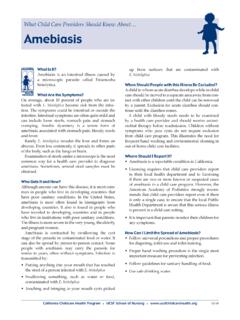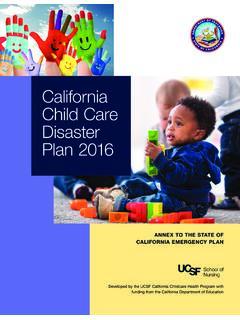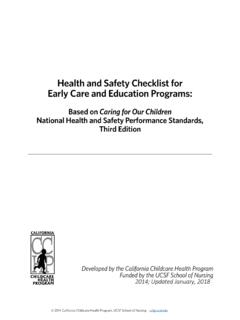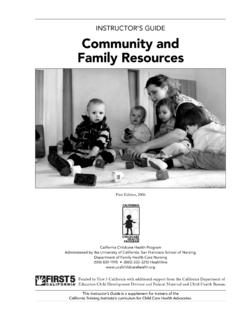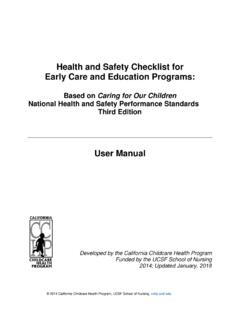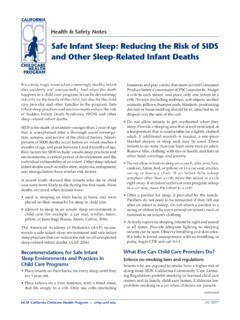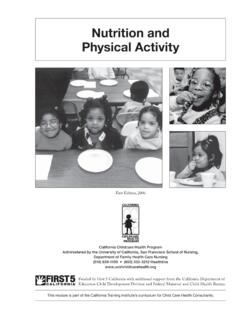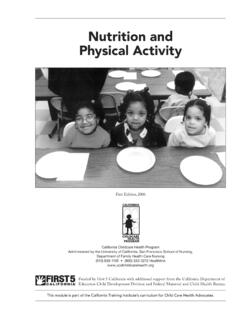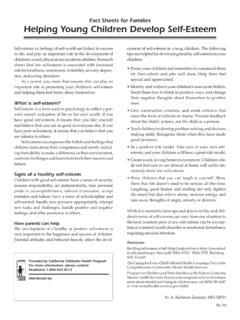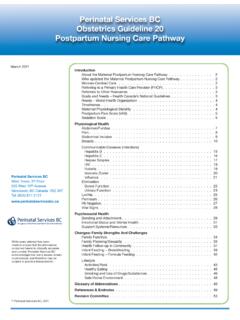Transcription of Social and Emotional Development of Children
1 This module is part of the California Training Institute s curriculum for child care Health and Emotional Development of ChildrenCalifornia Childcare Health ProgramAdministered by the University of California, San Francisco School of nursing , Department of Family Health care nursing (510) 839-1195 (800) 333-3212 by First 5 California with additional support from the California Department of Education child Development Division and Federal maternal and child Health Edition, 2006 AcknowledgementsTh e California Childcare Health Program is administered by the University of California, San Francisco School of nursing , Department of Family Health care wish to credit the following people for their contributionsof time and expertise to the Development and review of this curriculum since e names are listed in alphabetical order.
2 Main Contributors Abbey Alkon, RN, PhDJane Bernzweig, PhDLynda Boyer-Chu, RN, MPHJudy Calder, RN, MSLyn Dailey, RN, PHNJ oanna Farrer, BA, MPPR obert Frank, MSLauren Heim Goldstein, PhDGail D. Gonzalez, RNJan Gross, BSN, RNSusan Jensen, RN, MSN, PNPJ udith Kunitz, MAMardi Lucich, MACheryl Oku, BATina Paul, MPH, CHESPamm Shaw, MS, EdDMarsha Sherman, MA, MFCCKim To, MHSE ileen Walsh, RN, MPHS haron Douglass Ware, RN, EdDMimi Wolff , MSWR ahman Zamani, MD, MPHE ditorCatherine Cao, MFACCHP StaffEllen Bepp, Robin Calo, Sara Evinger, Krishna Gopalan, Maleya Joseph, Cathy Miller, Dara Nelson, Bobbie Rose, Griselda Th omas Graphic DesignersEdi Berton (2006)Eva Guralnick (2001-2005)
3 California Childcare Health ProgramTh e mission of the California Childcare Health Program is to improve the quality of child care by initiating andstrengthening linkages between the health, safety and child care communities and the families they of this curriculum were adapted from the training modules of the National Training Institute for child care Health Consultants, North Carolina Department of maternal and child Health, Th e University of North Carolina at Chapel Hill; by First 5 California with additional support from the California Department of Education child Development Division and Federal maternal and child Health and Emotional Development of ChildrennCalifornia Training InstitutenCalifornia Childcare Health Programn1 LEARNING OBJECTIVESTo describe the Social and Emotional Development of young identify why young Children behave in diff erent describe the impact Children with challenging behaviors have on early care and education (ECE) programs, staff and describe three ways a child care Health Advocate (CCHA)
4 Can assist ECE programs with meeting the needs of Children with behavioral health identify resources available to assist and support ECE providers and important role of the CCHA is to help ECE providers and families work together to support Children s Social and Emotional Development , and to provide resources and referrals for families who need them. ECE providers spend a great deal of time and energy managing Children s behavior. Many Children in ECE programs show diffi cult or hard-to-manage behaviors. To be able to work well with all Children and their families, CCHAs need to understand Children s Social and Emotional Development and to understand why Children behave the way they do.
5 In this module, the terms diffi cult, challenging and hard-to-manage all mean the same thing when they are used to describe and Emotional Development of ChildrennA Curriculum for child care Health AdvocatesWHAT A CCHA NEEDS TO KNOWTo encourage healthy Social and Emotional develop-ment, ECE providers must be familiar with the vari-ous stages of Development for young Children , as well as understand that each child develops at his or her own pace. Th e process and timing of Development is not the same for every child . Th e fi rst 5 years of life are a critical time in the devel-opment of young Children .
6 Children s early Social and Emotional Development depends on a variety of fac-tors, including genes and biology ( , physical health, mental health and brain Development ) and environ-mental and Social issues ( , family/community, par-enting and child care ). Th ese factors can have a posi-tive or negative infl uence on Children s Development . Some Children may have diffi cult behaviors that make it harder to adjust to an ECE program (Haring, Bar-ratt & Hawking, 2002). Research shows that brain Development during the fi rst 5 years of life creates learning patterns that can last a lifetime.
7 ECE pro-grams which create trusting, safe and developmen-tally appropriate environments can help Children learn to adjust to changes in their lives, get along well with others and be healthy. A socially and emotionally healthy child will be ready to start school and thus, fully participate in learning experiences and form good relationships with caregivers and peers (Peth-Pierce, 2000).Th e following issues, either within the child or within the environment, infl uence young Children s Social and Emotional Development in the fi rst 5 years of life: overall physical health of the child child s temperament (style of behavior the child is born with) family stress and resources available to provide support and how this is handled community stress and resources child s experience in ECE programs, including child -ECE provider relationships, group size, training for ECE providers, expectations of ECE providers and consistency in caregiving goodness of fi t between the child and the parent (Does the child meet the parents expectations?)
8 Do their temperaments match?) child abuse exposure to violence in the home or the community parent- child relationship parents ability to cope with demands of parenting parents self-esteem capacity to protect the child from overstimulation Social supportsTHE ROLE OF THE CCHAB ecause CCHAs are often in the ECE program ev-eryday, they can observe Children playing with diff er-ent people and at various times across a period of sev-eral weeks. Th eir role includes working closely with the ECE staff to identify Children whose behavior or health are of concern or raise questions.
9 Th e CCHA can talk about possible causes of troubling behavior, talk to the program director and child care Health Consultant (CCHC), and participate in developing good intervention strategies and action plans that fo-cus on improving the Social and Emotional develop-ment of young Children in ECE programs and that focus on addressing the behavior. CCHAs should also make sure staff and parents talk to one another regu-larly about any confl icts or problems, and support fol-low-up activities as necessary. Th e CCHA can serve as the key contact at the ECE BehaviorJust as physical Development occurs in ages and stag-es, so too does Social and Emotional growth and de-velopment.
10 Being familiar with the appropriate ages and stages of Social and Emotional Development is im-portant to be able to accurately understand Children s behavior. Th ere are many factors which aff ect a child s behavior that the CCHA should know is the main way Children let adults know what their needs are. Young Children who cannot yet speak often communicate by using body language and Emotional expressions, such as crying, cooing or smil-ing. Children from birth to 5 years of age have a lim-ited ability to understand and to express themselves clearly using words. However, their general behavior, and ability to play well with other Children and with adults can tell us a great deal.
